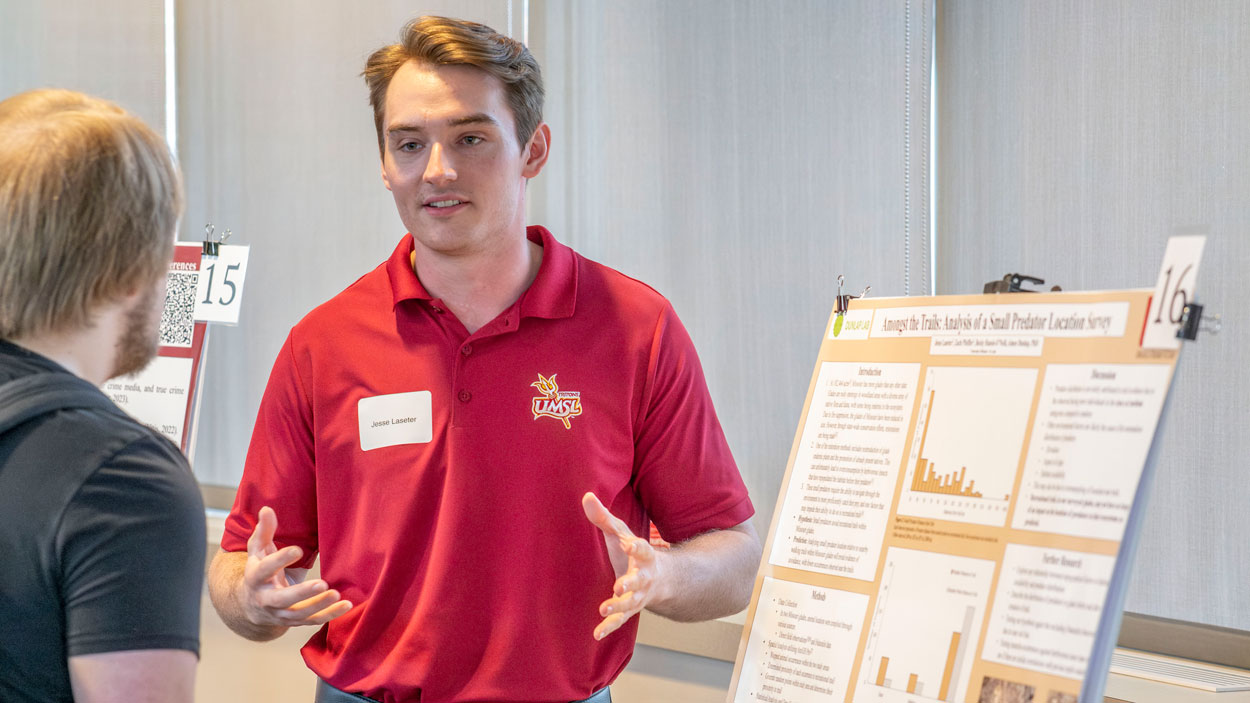
Biology graduate Jesse Laseter discusses his research on small predators in Missouri glades during the Undergraduate Research Symposium on April 26. (Photo by Derik Holtmann)
A small part of Jesse Laseter might have felt bad for missing his chance to walk across the commencement stage last weekend at the University of Missouri–St. Louis.
But the new biology graduate was eager to take advantage of one of the learning opportunities at his new job as a resource management technician with the Missouri Department of Conservation.
Rather than joining classmates in their caps and gowns, Laseter, who graduated magna cum laude, spent his Saturday with some of his new colleagues getting training on banding Canada geese, a practice the department deploys to gain important insights into how they move about in both urban and rural environments around the state.
“It’s great,” Laseter said. “They’re giving me all these training opportunities. They’re completely optional, but they really want me to increase my knowledge in conservation. So, I’m getting chainsaw certified, ATV certified. You can get a certification in aquatic plant identification. There are all these great opportunities they’re providing me, and I’m just so excited to participate.”
Laseter feels lucky to be immersing himself in his new role rather than on the job search.
He landed his opportunity at the Missouri Department of Conservation in mid-February. He remembers vividly getting a phone call one afternoon in Benton Hall, a few weeks after applying and interviewing for the job.
“The building can have sketchy cellular service, and I got this random call from a Kirkwood number,” he said. “I’m answering it thinking it was just some spam call. But I heard a voice saying like, ‘Oh, this is Erin Shank with the Department of Conservation. We want to …’ Then it cuts out.”
Laseter was suddenly in a panic, running upstairs to hopefully find a stronger signal so he could call her back. He was able to reach her, and she told him they wanted to offer him the job.
“I was just ecstatic,” Laseter said. “I was kind of jumping around a little bit by these windows in Benton Hall. I just remember walking in circles and not being able to believe it.”
Laseter knew there was stiff competition for the position and wasn’t sure he was qualified after learning about other applicants with more specific degrees in wildlife management. But he also had a leg up because he’d met Shank, the St. Louis Community and Private Land Conservation Unit supervisor, and one of her colleagues a few months earlier through his work as an undergraduate researcher in Associate Professor Aimee Dunlap’s Cognitive Ecology Lab. A doctoral candidate in the lab, Becky Hansis-O’Neill, had organized a population survey of tarantula and herpetofauna near recreation trails in Jefferson County that Laseter assisted with.
“Because these tarantulas are in a community of high conservation concern, people from the department” – including Shank – “happily joined along,” Laseter said. “That’s where I got to know them, and that was probably my in.”
Laseter hadn’t given much thought to working in conservation when he arrived at UMSL after transferring from St. Louis Community College–Meramec. He’d planned to major in biology and was interested in working in a lab, but he always figured his focus would be on cellular or molecular biology.
He described a career fair organized by the Department of Biology in Benton Hall as a turning point in his educational journey. At the fair, he spotted a table with representatives of the Litzsinger Road Ecology Center in Ladue, not far from where he grew up in Brentwood. They were discussing different projects they were working on, including one involving native bees.
“It was a lot of hands-on work,” Laseter said. “It sounded interesting if I wanted to work outside versus in a lab, or a little bit of both.”
A few months later, Laseter learned about the opportunity to do undergraduate research in ecology and conservation in Dunlap’s lab, which specializes in studying the role of environmental variability in the evolution and ecological function of cognition.
“I didn’t even really know that you could work in labs or volunteer,” Laseter said. “I had a friend that took one of her classes, and she was talking about needing research aides.”
The experiences he’s had since joining the lab – and through his extracurricular involvement with the UMSL Environmental Adventure Organization and UMSL Sustainability – enhanced the lessons he gained from his biology professors in the classroom.
That’s included assisting Hansis-O’Neill with her research on tarantulas.
“He works very hard and loves being outside,” she said. “His positive attitude keeps everyone’s spirits up, which is important when you’re doing fieldwork because it’s often hot or raining or there are ticks everywhere. Additionally, he learned how to handle our genetic samples and taught himself how to use ArcGIS to make maps.”
Hansis-O’Neill challenged him to do more over the past year.
“At one point I told him ‘It’s time to take off the training wheels,’ and he just ran with it,” Hansis-O’Neill said. “He started analyzing the data he collected, and we started to have conversations about how exactly he should approach that. Those conversations were collegial rather than between a teacher/mentor and student. What better outcome could anyone hope for at the end of a degree program?”
Laseter presented some of his own research he did alongside fellow biology major Zachary Pfeiffer during the University of Missouri System’s Undergraduate Research Day at the Capitol in Jefferson City in early April. The two gave a poster presentation highlighting their work surveying small predators in Missouri glades, for legislators in the building’s rotunda. Specifically, they discussed the important role small predators play in controlling the population of herbivores and why it’s so critical for the health of plants and restoring the glades.
Laseter also showcased this work on April 26 during UMSL’s Undergraduate Research Symposium.
On April 30, he and Pfeiffer received the Arnold B. Grobman Award for “outstanding efforts in field biology, ecology, evolution or plant or animal behavior as an undergraduate student” at the Department of Biology’s annual awards ceremony.
Laster credited Hansis-O’Neill for encouraging him to take advantage of those opportunities. She’s been a mentor to him over the past year and a half.
“She’s just tremendous,” Laseter said. “She is a star at what she does. She pushed me to even apply to that job. Without her, I probably wouldn’t be anywhere near where I am today. I want to give her a little thanks.”
Laseter started working part-time for the Department of Conservation this spring, mixing in some field work with online training, as he finished the final few classes he needed to earn his degree.
As a full-time staff member, he is joining the Community Conservation Team, which does conservation work throughout the St. Louis region.
“We actually focus on what we call Tier 1 communities,” Laseter said. “They make tiers for urban areas, focusing on equity, income, racial factors and access to green spaces. We want to improve what little green spaces there are in these Tier 1 communities. So, I’ll be focusing most of my time in these areas to hopefully provide better urban wild acres – these 11 sites around the St. Louis area.
“A lot of them are here in in North County and North City. There are some actually close to UMSL, so I won’t be too far from here if I ever want to come visit.”














